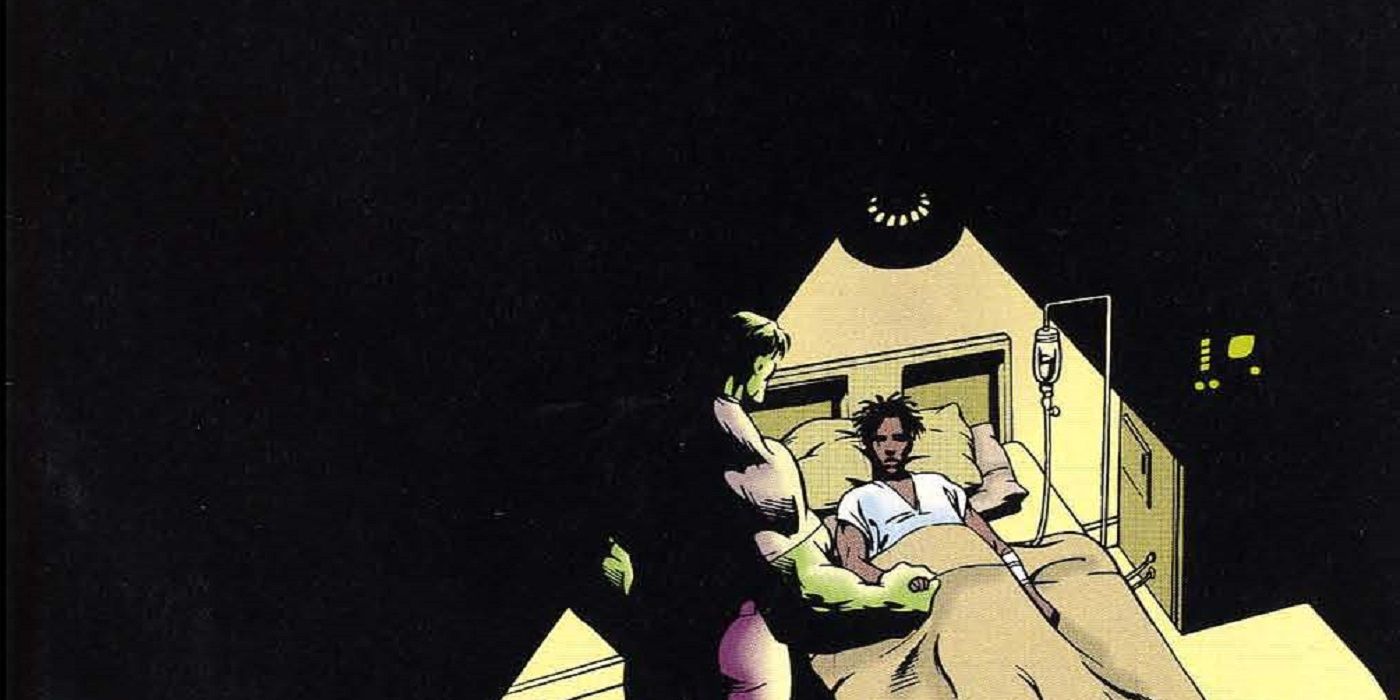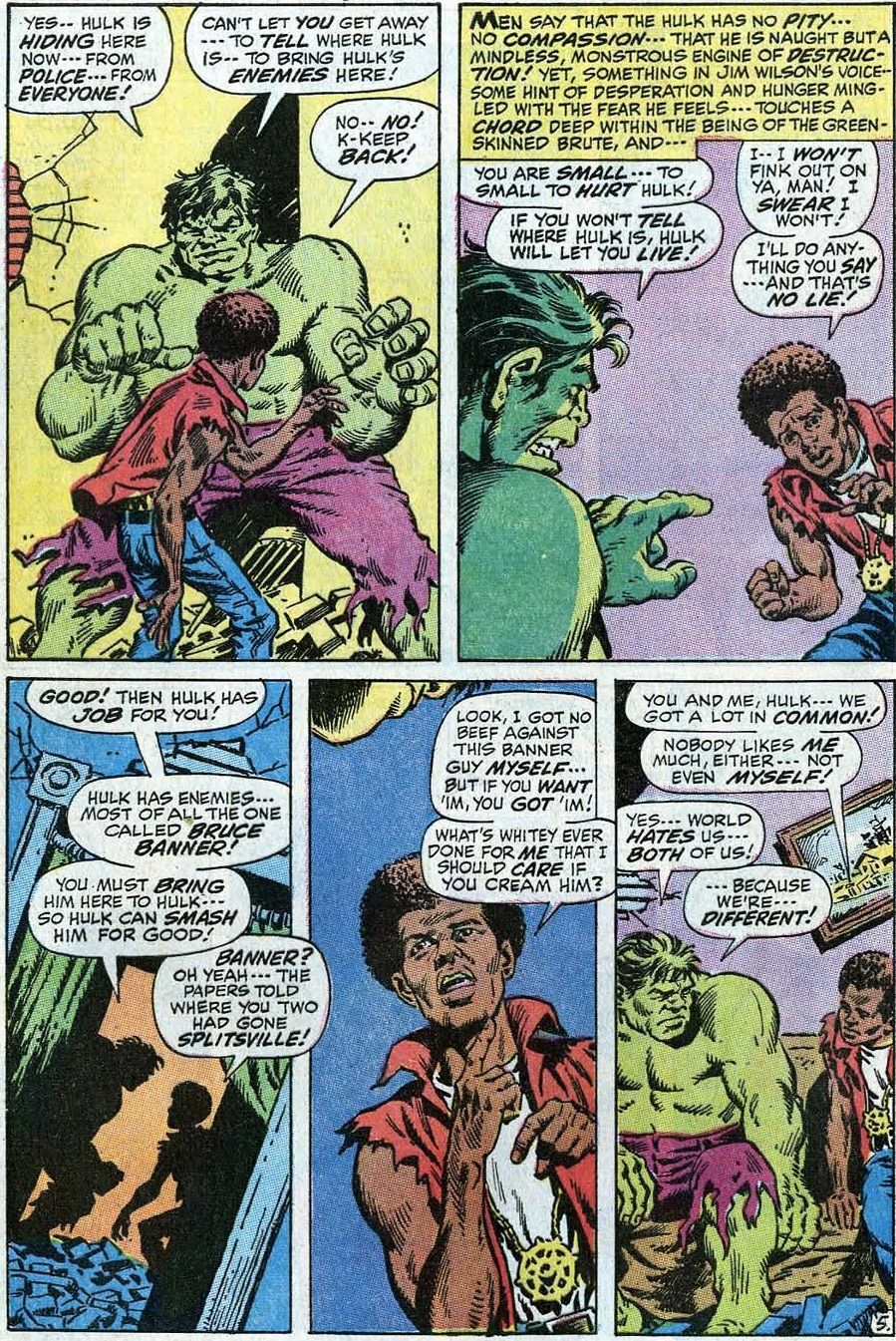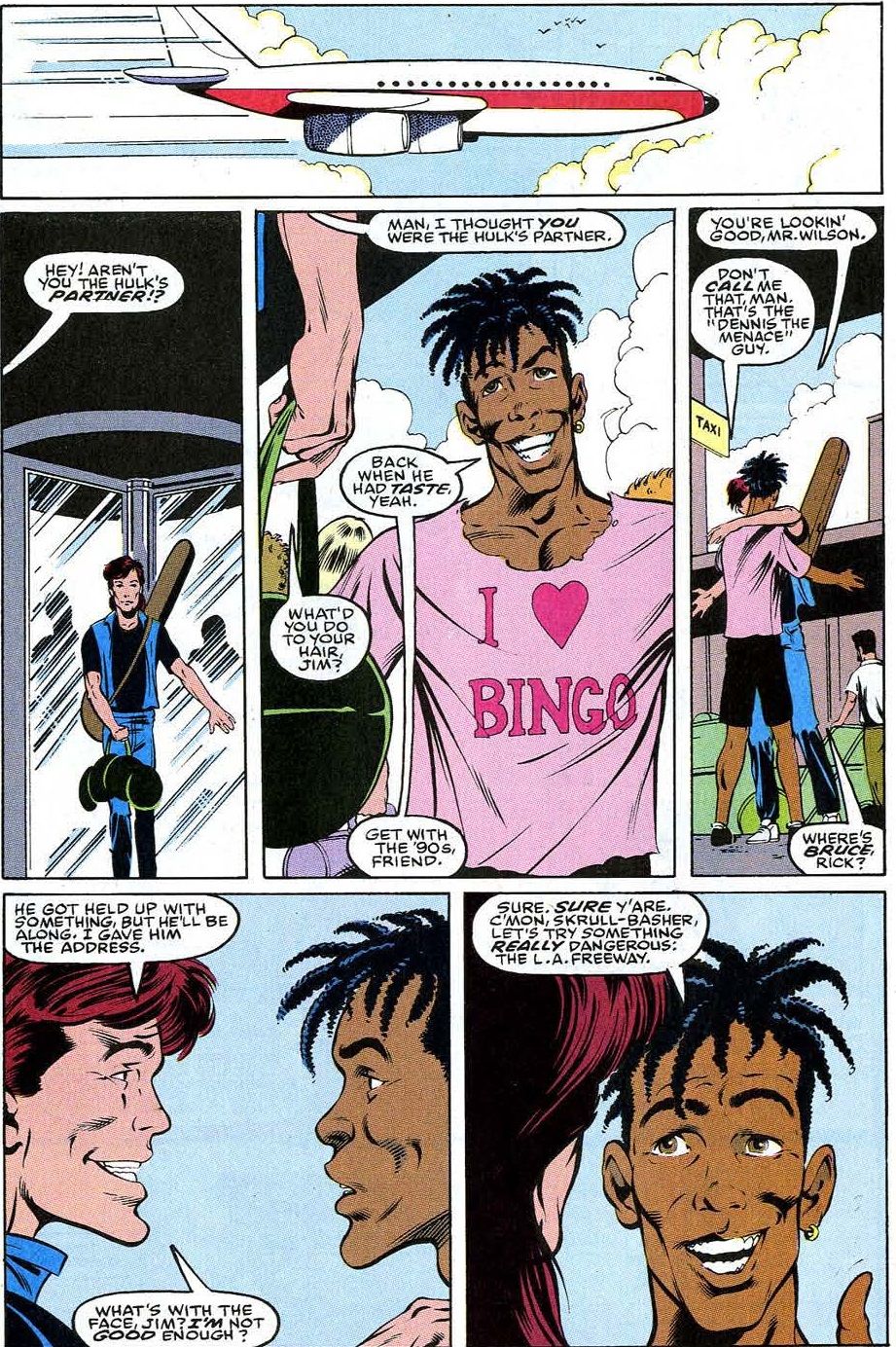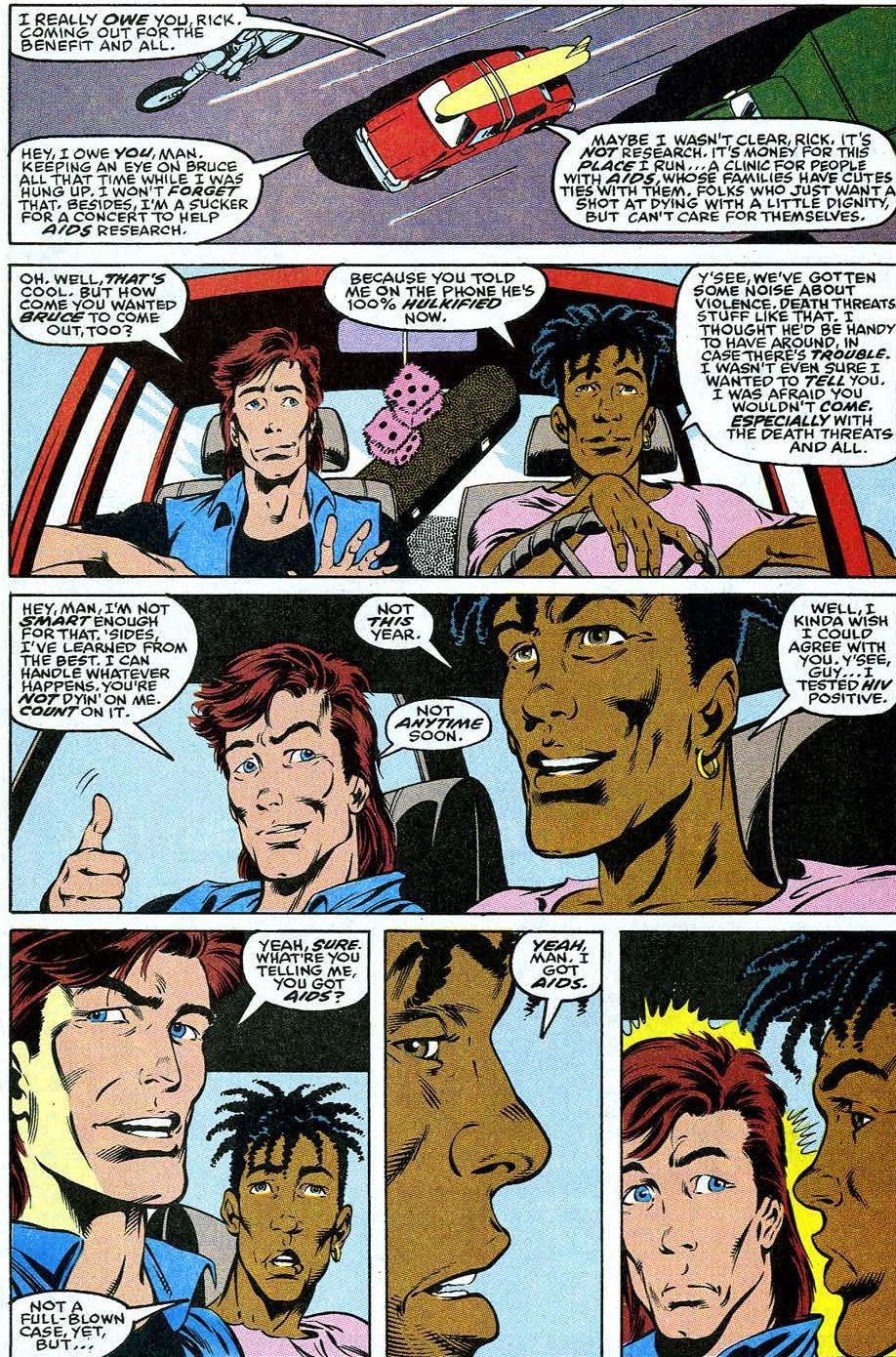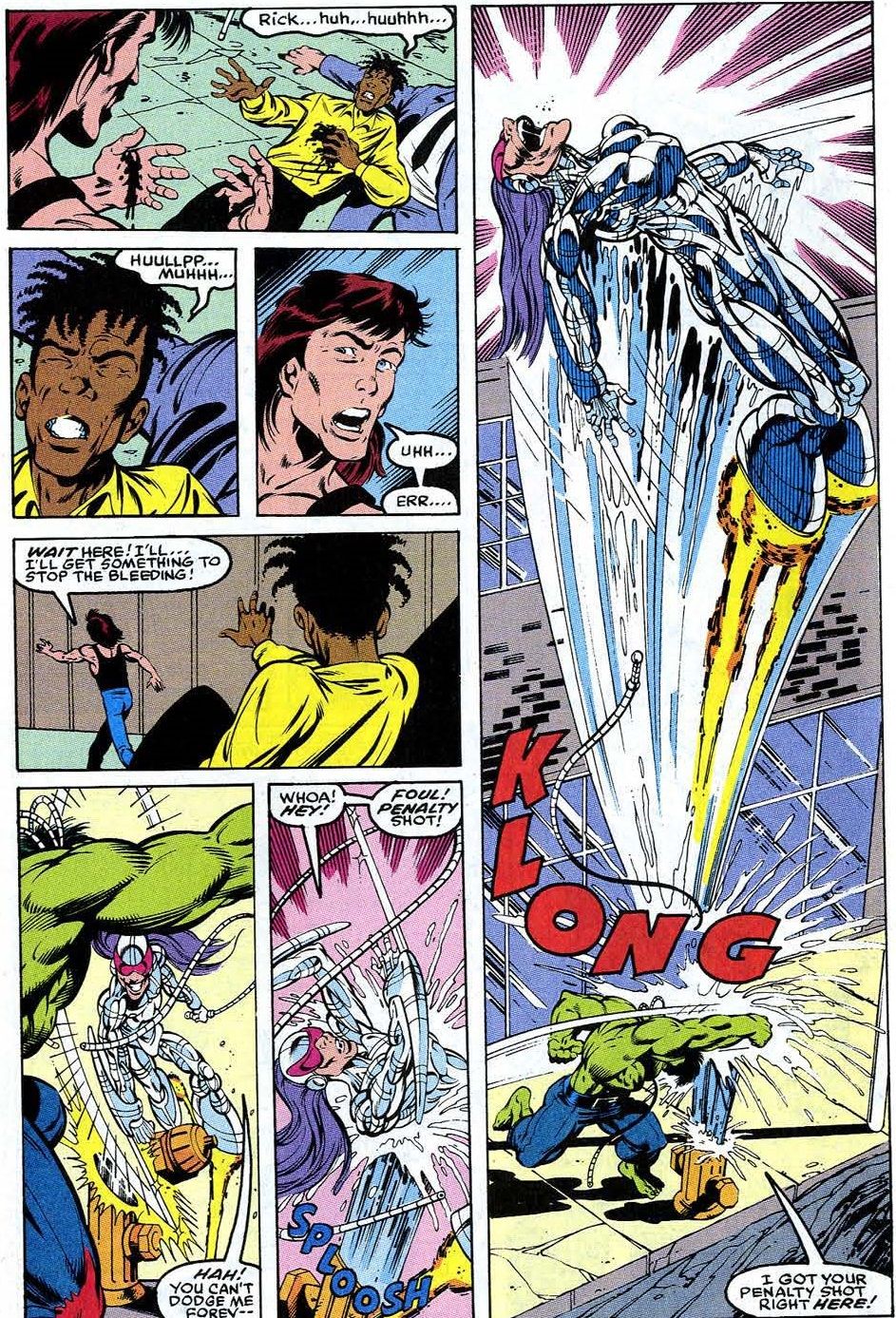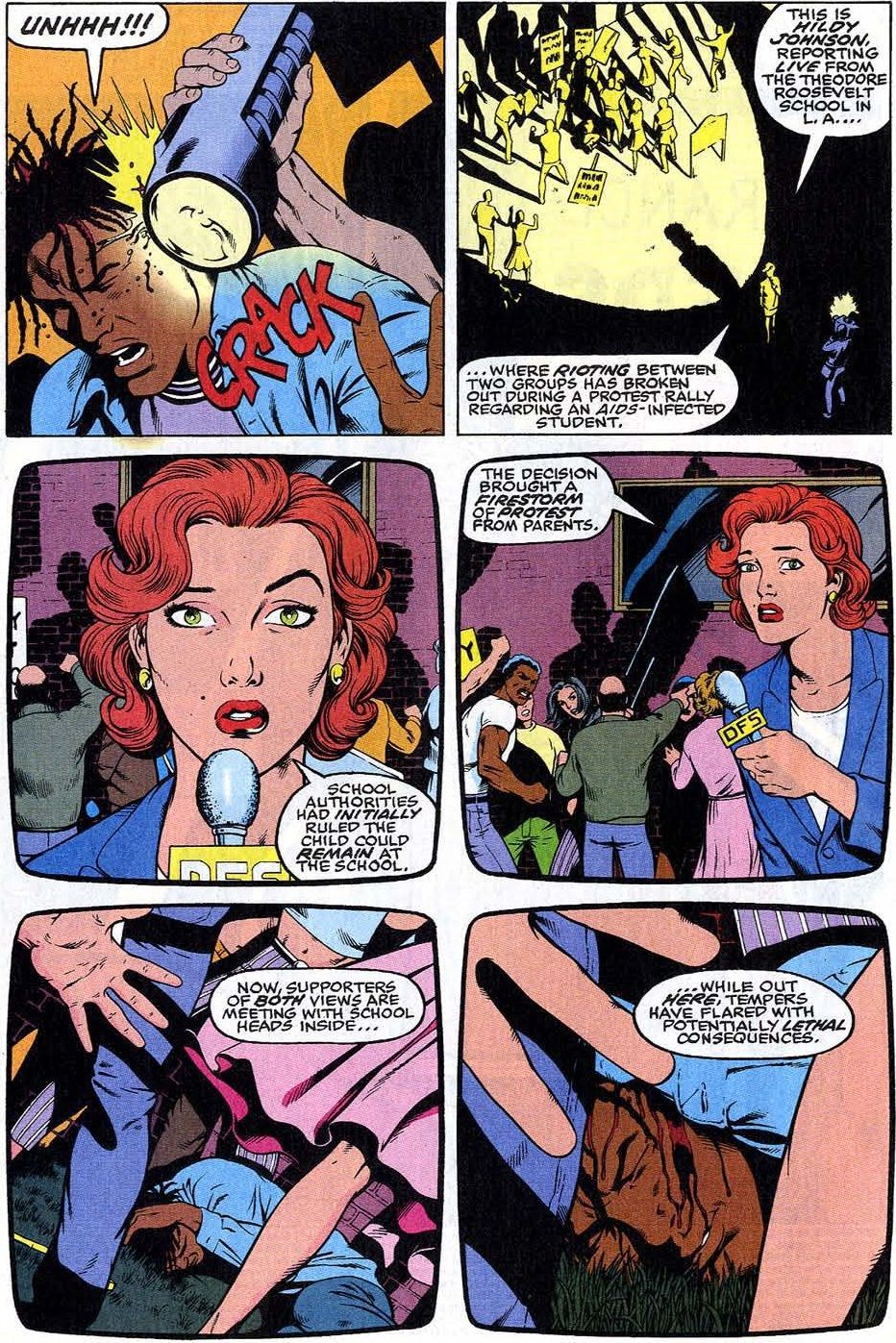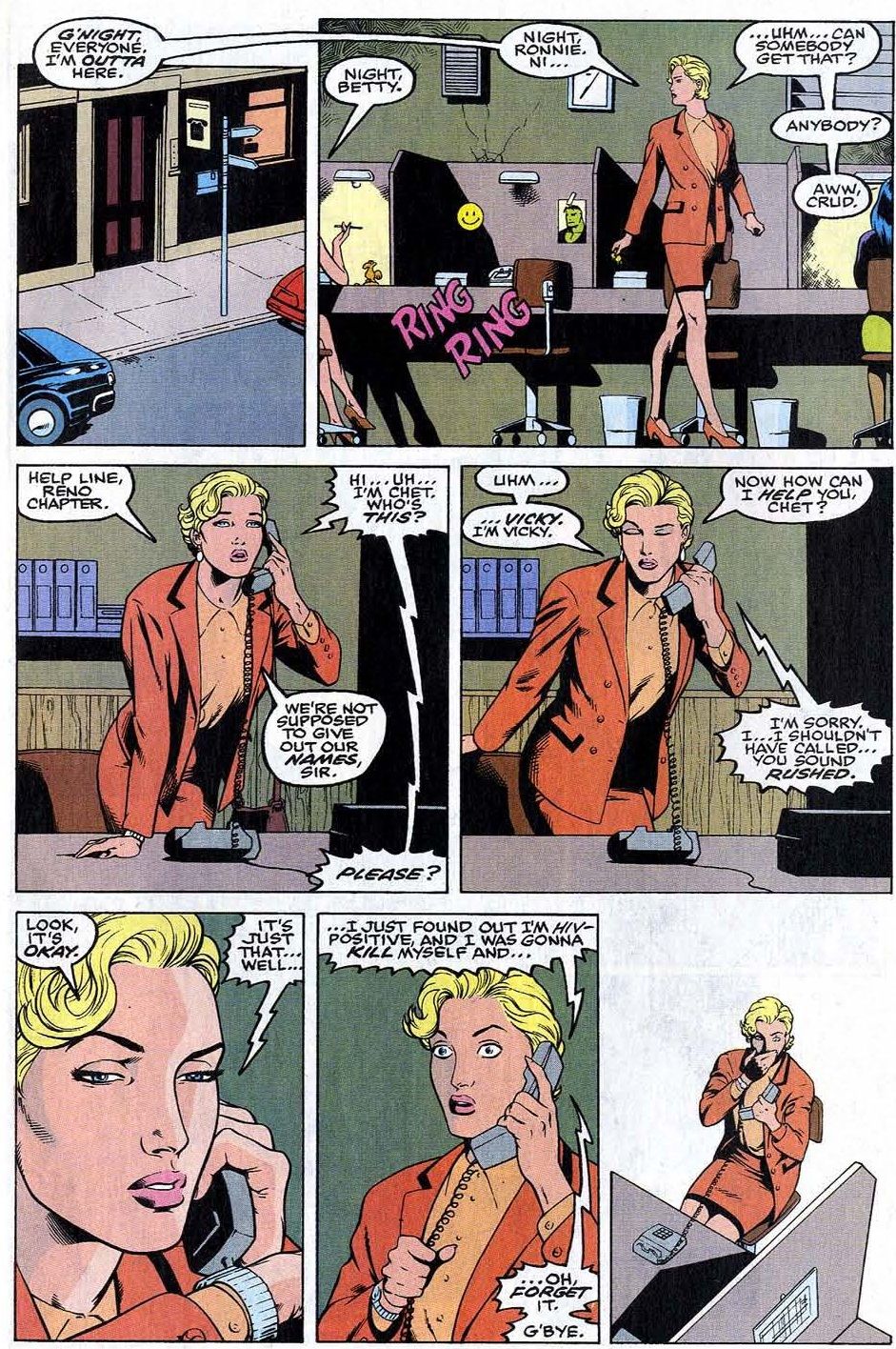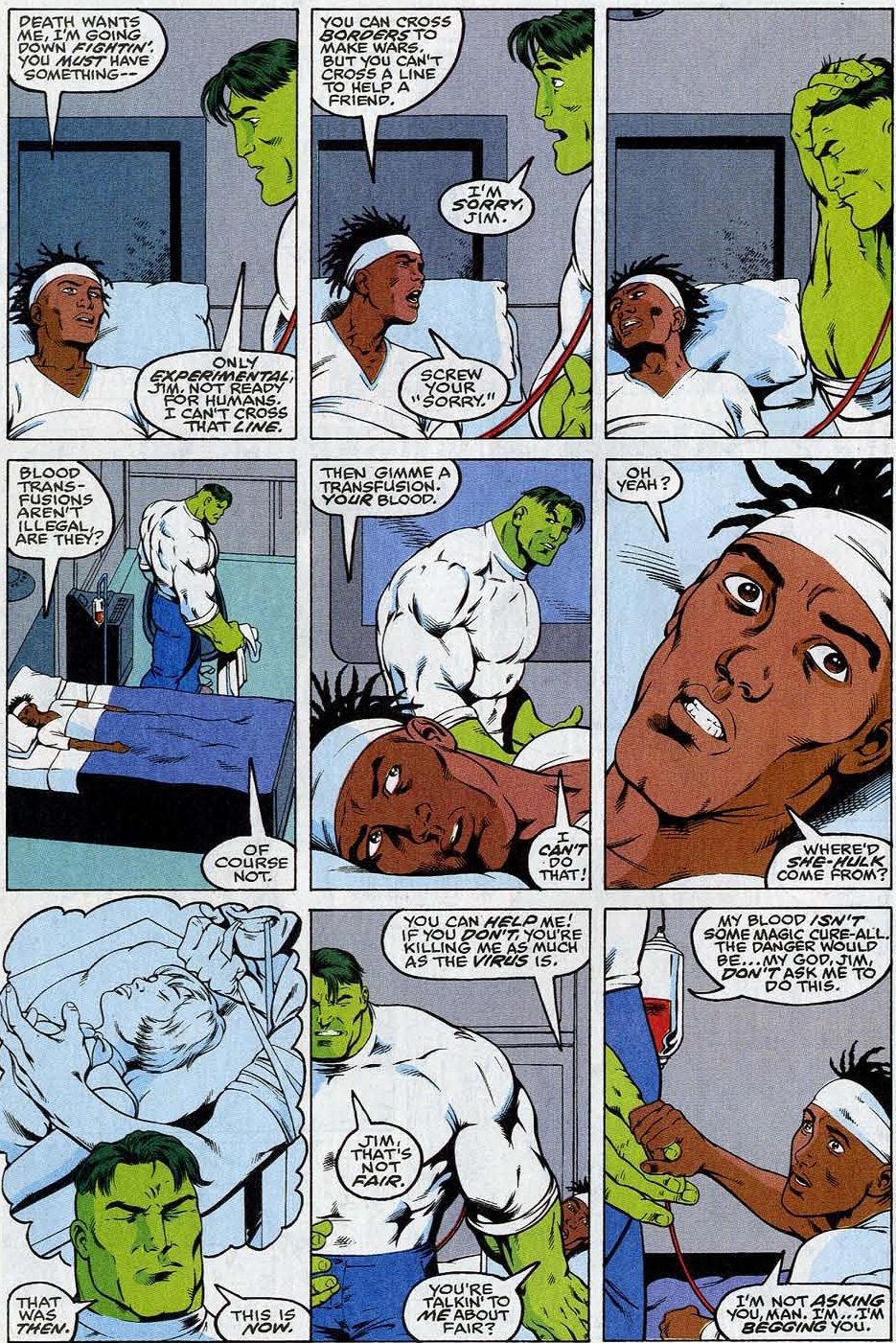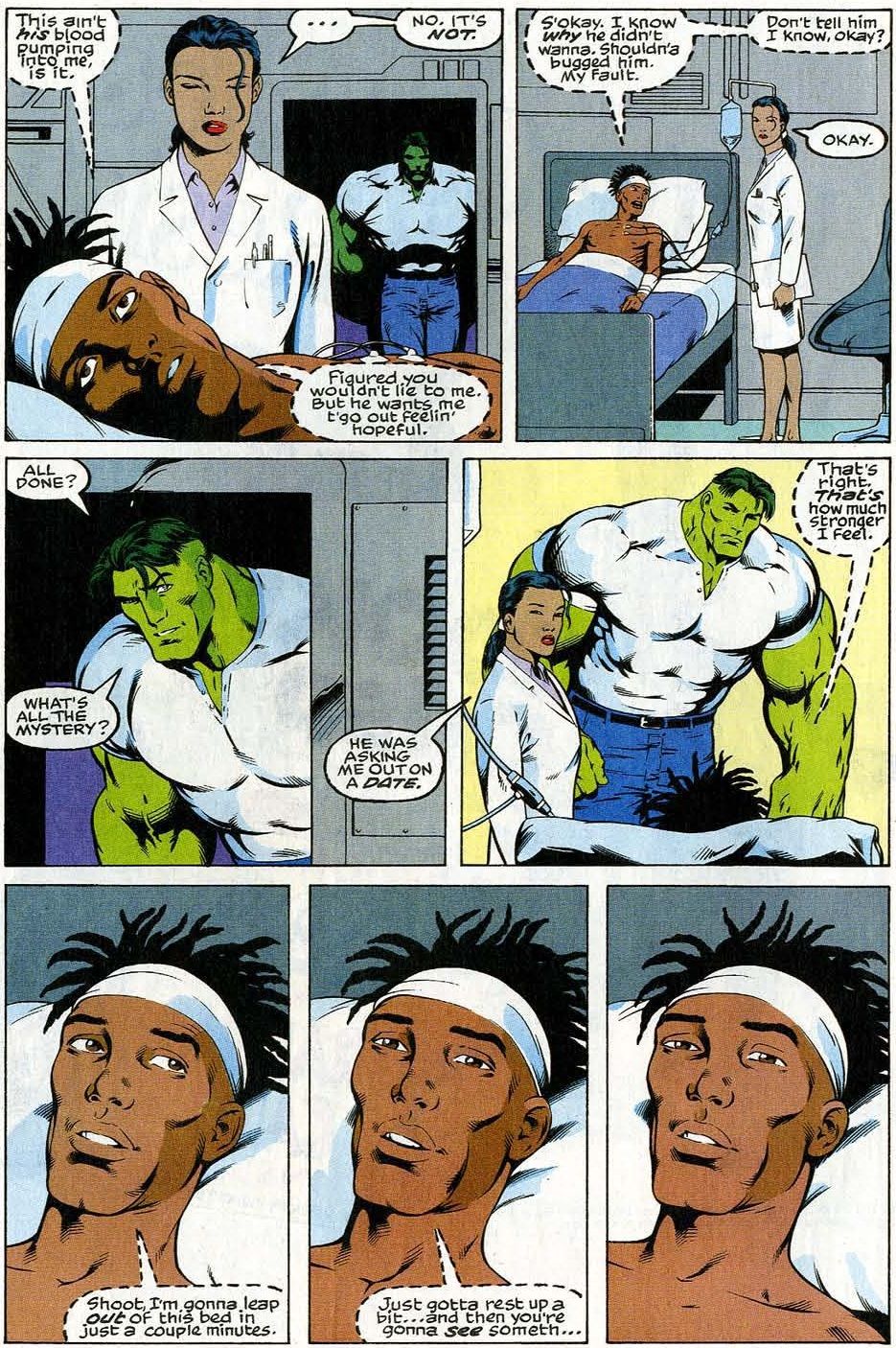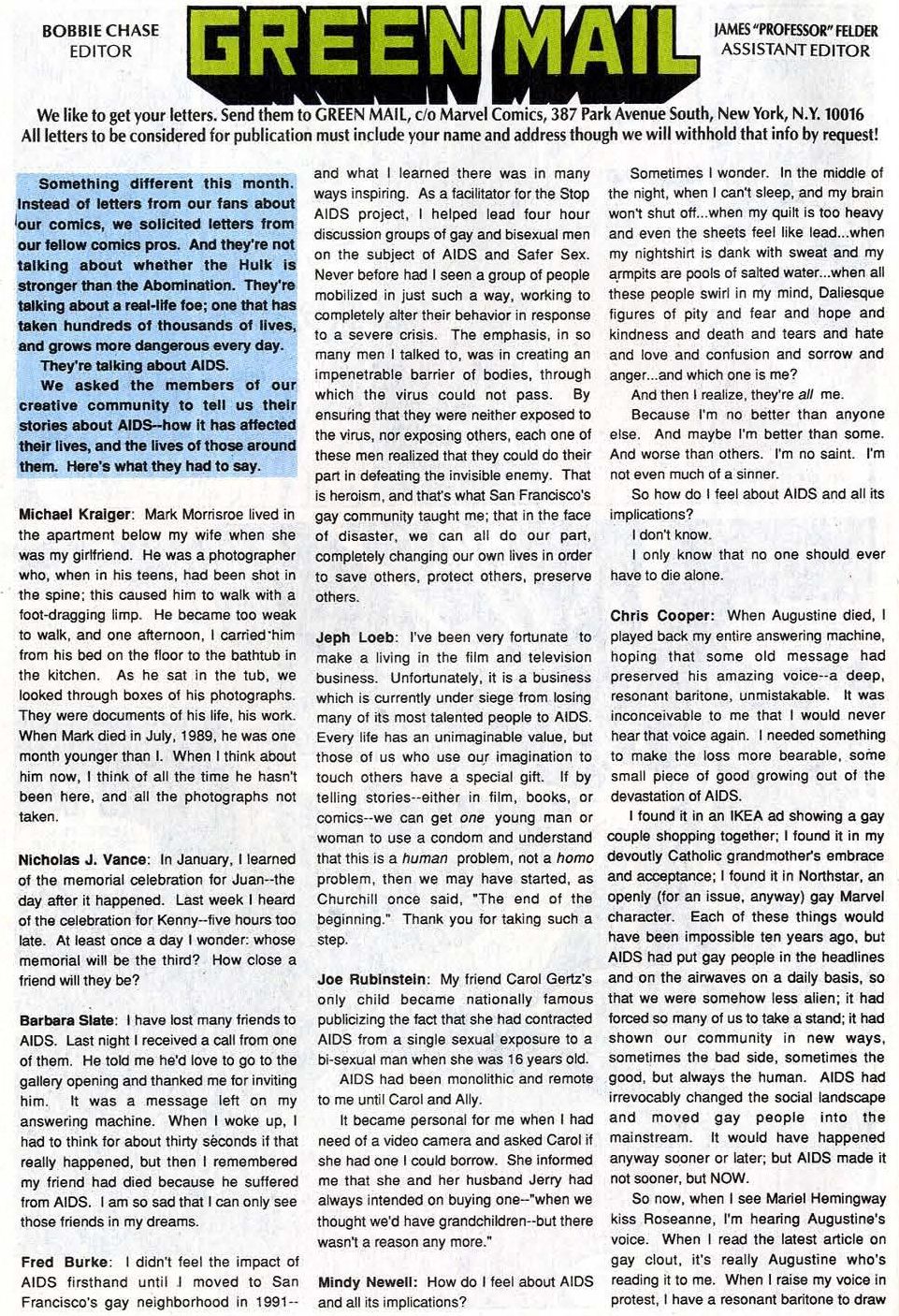This is "Look Back," a brand-new feature that I plan to do for at least all of 2019 and possibly beyond that (and possibly forget about in a week, who knows?). The concept is that every week (I'll probably be skipping the four fifth weeks in the year, but maybe not) of a month, I will spotlight a single issue of a comic book that came out in the past and talk about that issue in terms of a larger scale (like the series overall, etc.). Each week will be a look at a comic book from a different year that came out the same month X amount of years ago. The first week of the month looks at a book that came out this month ten years ago. The second week looks at a book that came out this month 25 years ago. The third week looks at a book that came out this month 50 years ago. The fourth week looks at a book that came out this month 75 years ago.
Today, we look at a remarkable issue of Incredible Hulk that came out in June 1994.
Jim Wilson debuted in Incredible Hulk #131 (by Roy Thomas, Herb Trimpe and John Severin) as a replacement for Rick Jones as the Hulk's new human partner...
His time in the Hulk's life was relatively brief. Over two hundred issues later, in Incredible Hulk #388 (by Peter David, Dale Keown and Mark Farmer) Jim was now working at an HIV/AIDS clinic in Los Angeles and flew out Rick Jones to play a charity performance (as well as bring the Hulk out because a supervillain had been threatening the clinic).
Jim reveals that he, too, has AIDS...
This leads to a poignant moment later in the issue where Rick, having had his hands sliced open by the supervillain, Speedfreek, hesitates before trying to help Jim, who has also been badly cut...
That issue was a very strong take on the subject for a 1991 comic book.
Anyhow, three years later, in Incredible Hulk #420 (by Peter David, Gary Frank and Cam Smith), Jim is injured at a protest defending a kid who was pulled out of school for having HIV...
Meanwhile, Betty Banner takes a call at her job at a suicide prevention center from a man who wants to kill himself because he is HIV positive (this cleverly allows David to dispel various myths about AIDS through Betty telling the same things to the man who wants to kill himself)...
As it turns out, Jim's situation is a lot more dire than he let on to Rick. Jim asks the Hulk for a blood transfusion but the Hulk doesn't want to risk mutating Jim into a monster...
In the end, the Hulk tells Jim that he will give him a blood transfusion, but he is lying. Jim figures it out right before he dies...
Betty's client (is that the right term?) ends the issue by killing himself.
This was no feel good silliness. This was addressing the tragedy of AIDS head on in brutal fashion.
The issue ends with a letter column filled with letters from comics professionals about how HIV/AIDS had affected their lives...
It is a bit hard to read them all, so I'll just re-type them here:
Michael Kraiger: Mark Morrisroe lived in the apartment below my wife when she was my girlfriend. He was a photographer who, when in his teens, had been shot in the spine; this caused him to walk with a foot-dragging limp. He became too weak to walk, and one afternoon, I carried him from his bed on the floor to the bathtub in the kitchen. As he sat in the tub, we looked through boxes of his photographs. They were documents of his life, his work. When Mark died in July, 1989, he was one month younger than I. When I think about him now, I think of all the time he hasn't been here, and all the photographs not taken.
Nicholas J. Vance: In January, I learned of the memorial celebration for Juan - the day after it happened. Last week I heard of the celebration for Kenny - five hours too late. At least once a day I wonder: whose memorial will be the third? How close a friend will they be?
Barbara Slate: I have lost many friends to AIDS. Last night I received a call from one of them. He told me he'd love to go the gallery opening and thanked me for inviting him. It was a message left on my answering machine. When I woke up, I had to think for about thirty second if that really happened, but then I remembered my friend had died because he suffered from AIDS. I am so sad that I can only see those friends in my dreams.
Fred Burke: I didn't feel the impact of AIDS firsthand until I moved to San Francisco's gay neighborhood in 1991 - and what I learned there was in many ways inspiring. As a facilitator for the Stop AIDS project, I helped lead four hour discussion groups of gay and bisexual men on the subject of AIDS and Safer Sex. Never before had I seen a group of people mobilized in just such a way, working to completely alter their behavior in response to a severe crisis. The emphasis, in so many men I talked to, was in creating an impenetrable barrier of bodies, through which the virus could not pass. By ensuring that they were neither exposed to the virus, nor exposing others, each one of these men realized that they could do their part in defeating the invisible enemy. That is heroism, and that's what San Francisco's gay community taught me; that in the face of disaster, we can all do our part, completely changing our own lives in order to save others, protect others, preserve others.
Jeph Loeb: I've been very fortunate to make a living in the film and television business. Unfortunately, it is a business which is currently under siege from losing many of its msot talented people to AIDS. Every life has an unimaginable value, but those of us who use our imagination to touch others have a special gift. If by telling stories - either in film, books, or comics - we can get one young man or woman to use a condom and understand that this is a human problem, not a homo problem, then we may have started, as Churchill once said, "The end of the beginning." Thank you for taking such a step.
Joe Rubinstein: My friend Carol Gertz's only child became nationally famous publicizing the fact that she had contracted AIDS from a single sexual experience to a bi-sexual man when she was 16 years old. AIDS had been monolithic and remote to me until Carol and Ally. It became personal for me when I had need of a video camera and asked Carol if she had one I could borrow. She informed me that she and her husband Jerry had always intended on buying one - "when we thought we'd have grandchildren - but there wasn't a reason any more."
Mindy Newell: How do I feel about AIDS and all of its implications? Sometime I wonder. In the middle of the night, when I can't sleep, and my brain won't shut off....when my guilt is too heavy and even the sheets feel like lead...when my nightshirt is dank with sweat and my armpits are pools of salted water...when all these people swirl in my mind, Daliesque figures of pity and fear and hope and kindness and death and tears and hate and love and confusion and sorrow and anger...and which one is me? And then I realize, they're all me. Because I'm no better than anyone else. And maybe I'm better than some. And worse than others. I'm no saint. I'm not even much of a sinner. So how do I feel about AIDS and all of its implications? I don't know. I only know that no one should ever have to die alone.
Chris Cooper: When Augustine died, I played back my entire answering machine, hoping that some old message had preserved his amazing voice - a deep, resonant baritone, unmistakable. It was inconceivable to me that I would never hear that voice again. I needed something to make the loss more bearable, some small piece of good growing out of the devastation of AIDS. I found it in an IKEA ad showing a gay couple shopping together; I found it in my devoutly Catholic grandmother's embrace and acceptance; I found it in Northstar, an openly (for an issue, anyway) gay Marvel character. Each of these things would have been impossible ten years ago, but AIDS had put gay people in the headlines and on the airwaves on a daily basis, so that we were somehow less alien; it had forced so many of us to take a stand; it had shown our community in new ways, sometimes the bad side, sometimes the good, but always the human. AIDS had irrevocably changed the social landscape and moved gay people into the mainstream. It would have happened anyway sooner or later; but AIDS made it not sooner, but NOW. So now, when I see Mariel Hemingway kiss Roseanne, I'm hearing Augustine's voice. When I read the latest article on gay clout, it's really Augustine who's reading it to me. When I raise my voice in protest, I have a resonant baritone to draw strength from. I just wish he hadn't had to die to be heard.
Gary Guzzo, for Fred: We all talked about AIDS. That was all we did. We saw the reports on TV, but it was still an illness that happened to other people. We saw the AIDS quilt on TV and were shocked at how many deaths it represented. We couldn't believe how fast the quilt grew in size - how many of those people were dying. We all talked about AIDS, but it never had a familiar face - until that Thanksgiving. Every Thanksgiving we have what we call "the orphans dinner" at my house. What we do is assemble all the people we know who don't have anywhere to go, and eat and drink until we're sick. This particular year, my landlord and his roommate, Fred, were invited to another "orphans dinner" upstate. Fred, an incredibly talented actor and theater director, had been sick for about a month with a stubborn cold, and decided he couldn't travel. There was no way in hell I was going to let someone who had been a close friend for ten years eat alone on Thanksgiving. He accepted, but apologized that he probably wouldn't be the ideal dinner guest. Dinner was excellent, as usual, but we all became concerned about Fred's health. After an intense coughing fit, I expressed my concern. "Don't worry," Fred remarked. "You won't catch what I have." One month later, Fred went into convulsions and was taken by ambulance to the hospital. He slipped into a coma the next day, and remained that way until his death from AIDS-related pneumonia, four months later. Fred discovered he had AIDS during the past summer, but due to his own feelings of shame and embarrassment, refused to confide in anyone about his condition, and refused to seek medical treatment. He was so concerned about the public's perception of AIDS patients, that he would rather die than be viewed as a leper. Now, whenever I talk about AIDS, there's a face that goes along with the disease. That face belongs to Fred Wolfe.
Don H. DeBrandt: My wife, Evelyn, is HIV positive. She had already been diagnosed when we met - when I asked her to marry me, we both knew that we'd have to make the most of whatever time we'd have together. And we have. When people ask me why I would want to marry someone dying of AIDS, I tell them, "If you know Evelyn, you wouldn't have to ask." Because Evelyn isn't dying; she's living. Her life may be shorter than most, but she fills every day with love and laughter. She is, without a doubt, the best person I know - and most of her friends, of which there are many, would say the same. I consider the fact that I've made her life a little happier the finest thing I've ever done.
Tom A. Tenney: It is said that it is better to have loved and lost than to never have loved at all. This sentiment is more true today than ever before. I am celebrating my eleventh year as a professional comic creator and have seen the comic industry handle many social issues in that period, none of which has caused such a social outcry as this vicious killer of men, women and children. We as individuals in this industry have a moral obligation to our youthful readers to teach them right from wrong. I have seen, read, and heard many attempts by people in the industry to handle this delicate issue and try as hard as we might or ever will, we can only help in our limited ways. But if our effort touches one individual, we have done more than our job. And that is why I take pride in the people, the companies and their efforts to save that one person and caress the souls of the other hundreds of thousands inflicted with this deadly disease. God have mercy on us all!
Kelly Corverse: In The Shadow of AIDS In the shadow of AIDS, we live our lives, Dreading all the sad goodbyes.
In the shadow of AIDS, we cast no blame, But wonder who it next will claim.
In the shadow of AIDS, a world unclear, As ignorance doth fuel the fear.
In the shadow of AIDS, we remember the dead, As a family united in ribbons of red.
The list goes on, as memories fade. Of dearest friends, we'd never trade.
Bill, Eddie, George and Ron. Their smiles and their laughter gone. Charlie, Robert, Mark and Ed. Reasons for the tears I shed.
In the shadow of AIDS, we cannot hide. Hand in hand, we walk with pride.
In the shadow of AIDS, with friends who care, Who help us when life seems unfair.
In the shadow of AIDS, victims fight, With Hopes to make the future bright.
In the shadow of AIDS, of this we're sure, When we band together, we will find a cure.
Beautiful stuff.
Now, 25 years later, HIV/AIDS is thankfully not the same sort of automatic death sentence that it once was, but it's interesting, while that's obviously 100% amazing news, it is almost as if the joy over that news has sort of made people not want to revisit the awful times of the past, and so a whole generation of people who lost SO MANY people to the disease are now almost pressured to be quiet about the past. These are people who are in their 40s, 50s, we're not talking ancient folks here - they are just normal people who survived a terrible ordeal and now that things have gone better, it's almost like their pain has been...not ERASED, but it certainly is not highlighted the way it probably should be. Seeing comic books like Incredible Hulk #420 show just how tragic things were in that moment.
If you have any suggestions for June (or any other later months) 2009, 1994, 1969 and 1944 comic books for me to spotlight, drop me a line at brianc@cbr.com! Here is the guide, though, for the cover dates of books so that you can make suggestions for books that actually came out in the correct month. Generally speaking, the traditional amount of time between the cover date and the release date of a comic book throughout most of comic history has been two months (it was three months at times, but not during the times we're discussing here). So the comic books will have a cover date that is two months ahead of the actual release date (so August for a book that came out in June). Obviously, it is easier to tell when a book from 10 years ago was released, since there was internet coverage of books back then.

